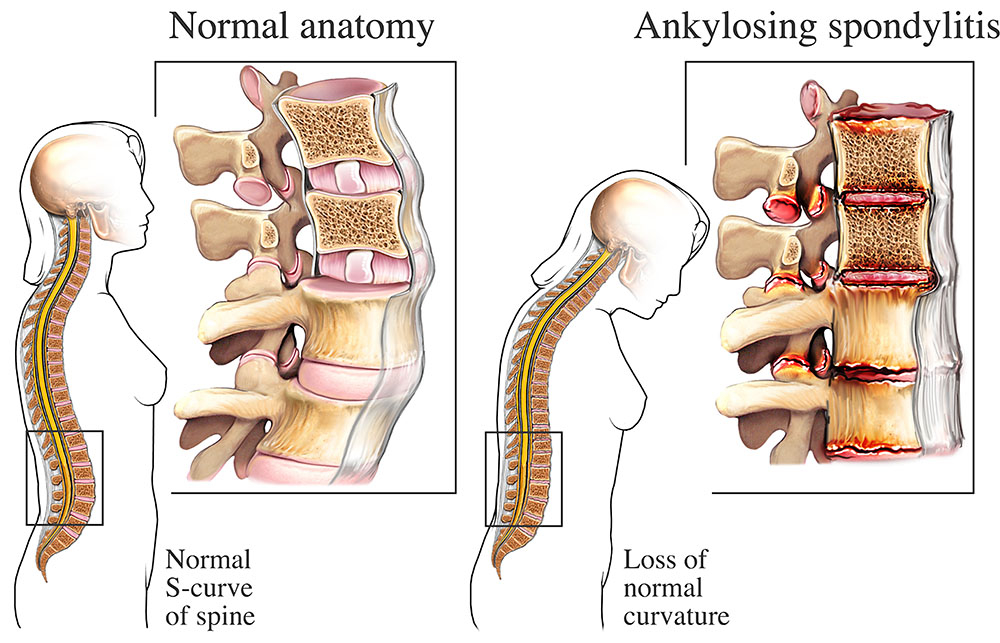- Home
- About Us
- Services
- Treatments
- Acid Reflux
- Allergic Rhinitis
- Alcoholic Fatty Liver
- Ankylosing Spondylitis
- Anxiety / Stress
- Arthritis
- Asthma
- Cervical Spondylitis
- Celiac Infection
- Colitis
- Constipation
- Dermatitis
- Detox Programme
- Diabetes (Madhumeha)
- Hair Fall
- Headache
- Hormonal Imbalance
- Hypertension
- Insomnia
- Irritable Bowel Syndrome
- Lungs Disease
- Migraine
- Neurological Disorder
- Non Alcoholic Fatty Liver
- Obesity Management
- Pain Management
- PCOD
- PCOS
- Sciatica Pain
- Sinusitis
- Skin Disorder
- Slip Disc
- Stress Management
- Thyroid
- Weight Management
- Techno-Ayurveda
- Media
- Blog
- Contact Us

Ankylosing Spondylitis
Understanding Ankylosing Spondylitis
Ankylosing spondylitis (AS) is a type of chronic inflammatory arthritis that primarily affects the spine and the sacroiliac joints, which are located at the base of the spine. Over time, the inflammation can cause the vertebrae (the bones of the spine) to fuse together, leading to reduced mobility and a permanent, hunched posture. AS is a form of autoimmune disease, meaning that the immune system mistakenly attacks the body’s own tissues, particularly the joints and spine.
AS primarily affects men in their late teens to early thirties, although it can develop at any age. It is part of a broader group of inflammatory diseases called spondyloarthropathies, which also includes conditions such as psoriatic arthritis and reactive arthritis.
Symptoms of Ankylosing Spondylitis
1. Ache and tightness, particularly in the lower back and buttocks
2. Painful joints, particularly in the hips and knees
3. Reduced spinal flexibility
4. Eye Inflammation (Uveitis)
5. Fatigue
6. Difficulty Breathing in Severe Cases
Common Causes of Ankylosing Spondylitis

Genetic Factors
Genetic factors play a significant role in ankylosing spondylitis, with the HLA-B27 gene being strongly associated. Individuals with this gene have a higher risk of developing the condition, which causes inflammation and eventual fusion of the spine and sacroiliac joints.

Immune System Dysfunction
Immune system dysfunction is a key factor in ankylosing spondylitis, where the body's immune system mistakenly attacks healthy joints and tissues. This abnormal immune response leads to inflammation in the spine and pelvis, causing pain, stiffness, and potential joint damage.

Environmental Factors
Environmental factors, such as infections or trauma, may trigger ankylosing spondylitis in genetically predisposed individuals. While the exact cause is unclear, environmental triggers can activate inflammation in the spine and joints, contributing to disease onset or flare-ups in susceptible people.
Panchakarma Ayurvedic Treatment for Ankylosing Spondylitis
Ankylosing Spondylitis (AS) is a chronic inflammatory autoimmune disorder primarily affecting the spine and sacroiliac joints, causing stiffness, pain, and in severe cases, fusion of the vertebrae. While conventional treatments aim to manage symptoms, Panchakarma, a specialized detoxification therapy in Ayurveda, offers a holistic approach to addressing the root causes of inflammation, reducing pain, and improving mobility.
Panchakarma is an Ayurvedic system of five therapeutic treatments designed to cleanse the body, balance the doshas (energetic forces), and restore overall health. The treatment is particularly beneficial for autoimmune and inflammatory conditions like ankylosing spondylitis, where vata and pitta doshas (related to movement and inflammation) may be aggravated. Panchakarma helps detoxify the body, reduce systemic inflammation, and promote healing in the affected joints and tissues.
How Panchakarma Helps Ankylosing Spondylitis
Detoxification: By cleansing accumulated toxins (ama) from the tissues, Panchakarma helps reduce inflammation, which is central to ankylosing spondylitis. The therapies remove the buildup of waste materials from the body, which can contribute to joint and spinal inflammation.
Balancing Doshas: In Ayurvedic terms, ankylosing spondylitis is often associated with an imbalance in vata (the dosha responsible for movement) and pitta (the dosha associated with heat and inflammation). Panchakarma therapies focus on restoring harmony to the doshas, especially to reduce the inflammation and stiffness that characterizes AS.
Pain Reduction and Mobility: Through the application of herbal oils, steam, and other therapeutic modalities, Panchakarma alleviates pain, reduces muscle spasms, and improves flexibility in the spine and joints.
Strengthening the Immune System: The treatment helps modulate the immune system, potentially addressing the autoimmune nature of ankylosing spondylitis, where the immune system attacks healthy tissue.
FAQs of Ankylosing Spondylitis
Ankylosing spondylitis (AS) is a chronic inflammatory arthritis that primarily affects the spine, causing pain, stiffness, and potential fusion of vertebrae.
Symptoms include chronic lower back pain, stiffness, limited spinal mobility, fatigue, and inflammation in other joints like hips or shoulders.
Diagnosis is based on medical history, physical exams, imaging tests (like X-rays or MRI), and blood tests to check for inflammation markers or the HLA-B27 gene.
